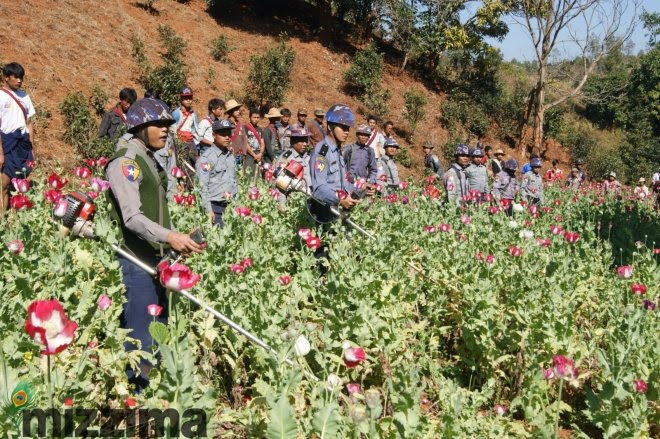Myanmar police working in a troubled Shan State township destroyed a record number of poppy fields there this year, but impoverished farmers in the area maintain they have little choice but to continue producing the illicit crop.
Major Myint Thein, chief of police in Pinlaung Township, in South Shan State, told Mizzima that the force destroyed over 7,600 acres of poppy fields, or about 95 per cent of the 2013 crop in the jurisdiction.

It was the largest number of poppy fields to be eradicated in any one year since authorities began destroying the crop in Pinlaung in 1984, Major Myint Thein said.
“We started destroying the crop in October, and got most of it while the plants were budding,” he said.
The force carried out the eradication policy with the cooperation of the Pa-Oh National Liberation Organization, or PNLO, an autonomous region established in 2010 that is backing the force’s anti-drug measures with its own awareness campaign.
Due to poverty, the region is a hub of opium production. Poppy is grown in around 94 of the 464 villages that comprise Pinlaung Township, amounting to a total of about 8,000 acres of the illegal crop.
“We used to cultivate tea before we started growing poppy on the hillsides,” said Khun Maung Hla, a poppy farmer in Htar Ngo village, located in Pinlaung Township, about 80 km southeast of Taunggyi. “Ever since tea prices dropped we’ve had to rely of growing poppy.”
Though they depend on the crop for their survival, these farmers risk stiff penalties in the event they are caught.
Myanmar police have destroyed fields of opium poppies in Pinlaung Township, southern Stan State. (Photo: John Chit Nyein)
“We tell farmers they risk going to prison, or even being sentences to death for selling the poppy oils obtained from scraping poppy pods,” said Major Myint Thein.
Major Myint Thein estimated his officers had seized poppy with a street value of more than 110,000,000 lakhs, equivalent to many millions of American dollars.
Last year was also a bumper year for poppy eradication, with 6,500 acres of the crop destroyed in 2012.
Yet authorities are well aware of the factors that continue to drive poppy cultivation in the region.
Major Myint Thein pointed out that Pinlaung Township has little arable land, and is characterized by hilly terrain unsuited for crops beyond poppy.
These circumstances are made more challenging by a scarcity of water and bad roads that make it difficult to get product to market, cutting into already thin margins.
Meanwhile, the prices poppy can fetch, coupled with the relative ease with which it can be cultivated, makes it hard for many farmers to resist. Khun Mg Hla, the poppy farmer from Htar Ngo village, said he can sell raw opium for at least four times what he can get for other crops.
“If we can’t grow poppy than we’ll need better techniques to cultivate other crops,” said said U Lun Kyaw, another farmer. “We also need access to markets for legal crops—which means decent transportation.”
The United Nations Office on Drugs and Crime (UNODC) has also said it would provide farmers with access to training in techniques for cultivating alternative crops, but so far no concrete steps have been taken.
Whatever the success of recent eradication measures, it is widely acknowledged that more needs to be done to stamp out poppy cultivation. On Jan. 12, authorities seized an astonishingly large haul of raw opium in Hti Tha La village.
Authorities said they had destroyed 27,000 acres of poppy fields in Shan State in 2013.
According to the UNODC, Myanmar is the second largest producer of poppy in the world after Afghanistan, and Shan State alone accounts for 90 per cent of the country’s total poppy output.


